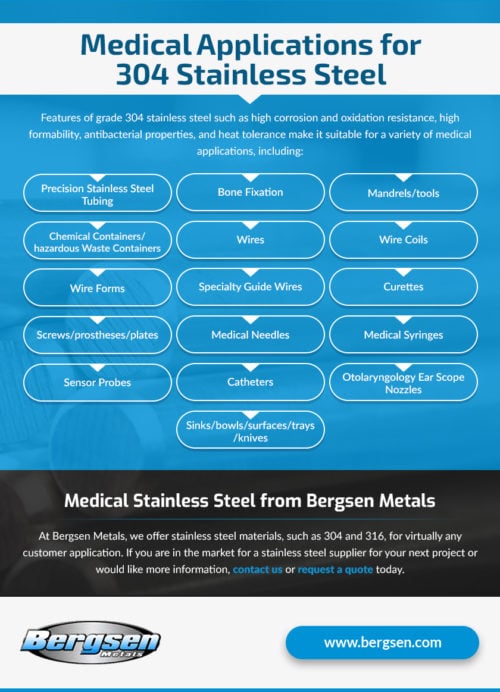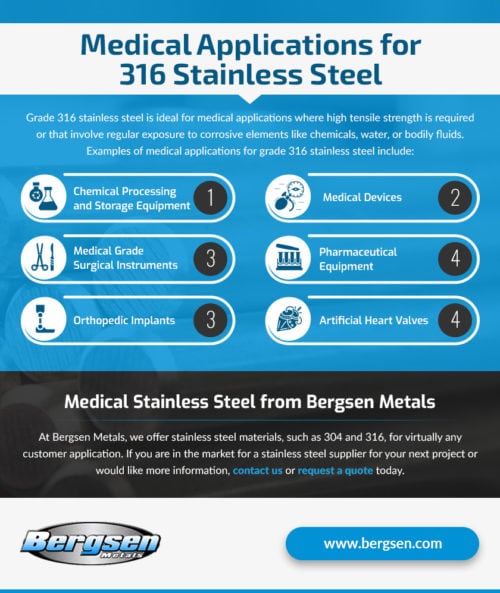Medical Grade & Surgical Stainless Steel
Stainless steel is a steel alloy that contains high percentages of iron and chromium, making it resistant to corrosion and wear. These alloys are further classified into families and grades that are defined by their unique characteristics and chemical compositions.
Medical grade stainless steels are part of the austenitic stainless steel family, a category known for its high formability and exceptional corrosion resistance. Grades 304 and 316 stainless steels contain high levels of nickel which provide additional chemical properties, making them suitable for use within the extreme demands of the medical industry.
What is 304 Stainless Steel?
Grade 304 stainless steel is a commonly used, strong, durable, and corrosion resistant medical grade alloy formed from approximately 18% chromium and 8% nickel. The addition of low levels of carbon and manganese allow 304 stainless steel to be resistant to oxidation, making it easy to clean and sterilize. Grade 304 stainless steel has a melting temperature ranging between 2,550 °F – 2,650 °F (1399 °C – 1454 °C), but it loses tensile strength as its temperature rises.
Medical Applications for 304 Stainless Steel

Features of grade 304 stainless steel such as high corrosion and oxidation resistance, high formability, antibacterial properties, and heat tolerance make it suitable for a variety of medical applications, including:
- Precision stainless steel tubing
- Bone fixation
- Mandrels/tools
- Chemical containers/hazardous waste containers
- Wires
- Wire coils
- Wire forms
- Specialty guide wires
- Curettes
- Screws/prostheses/plates
- Medical needles
- Medical syringes
- Sensor probes
- Catheters
- Otolaryngology ear scope nozzles
- Sinks/bowls/surfaces/trays/knives
What is 316 Stainless Steel?
Grade 316 stainless steel is composed of approximately 16% chromium, 10% nickel, and 2% molybdenum. High concentrations of chromium and nickel offer increased chemical resistance over other medical grade steels, while molybdenum helps to bolster corrosion resistance.
These elements’ combined properties create an improved resistance to harsh chemicals such as acids, alkalis, and chloride pitting. Although its melting range of 2,500 °F – 2,550 °F (1,371 °C – 1,399 °C) is lower than that of other surgical steels, grade 316 is durable enough to withstand even the most intense sterilization processes used in the medical industry.
Medical Applications for 316 Stainless Steel

Grade 316 stainless steel is ideal for medical applications where high tensile strength is required or that involve regular exposure to corrosive elements like chemicals, water, or bodily fluids. Examples of medical applications for grade 316 stainless steel include:
- Chemical processing and storage equipment
- Medical devices
- Medical grade surgical instruments
- Pharmaceutical equipment
- Orthopedic implants
- Artificial heart valves
Medical Stainless Steel from Bergsen Metals
At Bergsen Metals, we offer stainless steel materials, such as 304 and 316, for virtually any customer application. If you are in the market for a stainless steel supplier for your next project or would like more information, contact us or request a quote today.




